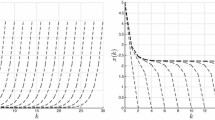Abstract
In this paper we establish turnpike results for a class of discrete-time optimal control problems. These control problems arise in economic dynamics and describe a nonstationary model proposed by Robinson, Solow and Srinivasan. We study the structure of approximate solutions which is independent of the length of the interval, for all sufficiently large intervals.
Similar content being viewed by others
References
Anderson, B.D.O., Moore, J.B.: Linear Optimal Control. Prentice-Hall, Englewood Cliffs (1971)
Arkin, V.I., Evstigneev, I.V.: Probabilistic Models of Control and Economic Dynamics. Nauka, Moscow (1979)
Atsumi, H.: Neoclassical growth and the efficient program of capital accumulation. Rev. Econ. Stud. 32, 127–136 (1965)
Aubry, S., Le Daeron, P.Y.: The discrete Frenkel-Kontorova model and its extensions I. Phys. D 8, 381–422 (1983)
Baumeister, J., Leitao, A., Silva, G.N.: On the value function for nonautonomous optimal control problem with infinite horizon. Syst. Control. Lett. 56, 188–196 (2007)
Blot, J., Cartigny, P.: Optimality in infinite-horizon variational problems under sign conditions. J. Optim. Theory Appl. 106, 411–419 (2000)
Blot, J., Hayek, N.: Sufficient conditions for infinite-horizon calculus of variations problems. ESAIM, COCV, Abr. 5, 279–292 (2000)
Blot, J., Hayek, N.: Conjugate points in infinite-horizon control problems. Automatica J. IFAC 37 (2001)
Coleman, B.D., Marcus, M., Mizel, V.J.: On the thermodynamics of periodic phases. Arch. Ration. Mech. Anal. 117, 321–347 (1992)
Evstigneev, I.V., Flam, S.D.: Rapid growth paths in multivalued dynamical systems generated by homogeneous convex stochastic operators. Set-Valued Anal. 6, 61–81 (1998)
Evstigneev, I.V., Taksar, M.I.: Rapid growth paths in convex-valued random dynamical systems. Stoch. Dyn. 1, 493–509 (2001)
Gale, D.: On optimal development in a multi-sector economy. Rev. Econ. Stud. 34, 1–18 (1967)
Glizer, V.: Infinite horizon quadratic control of linear singularly perturbed systems with small state delays: an asymptotic solution of Riccatti-type equation. IMA J. Math. Control Inf. 24, 435–459 (2007)
Jasso-Fuentes, H., Hernandez-Lerma, O.: Characterizations of overtaking optimality for controlled diffusion processes. Appl. Math. Optim. 57, 349–369 (2008)
Ali Khan, M., Zaslavski, A.J.: On a uniform turnpike of the third kind in the Robinson-Solow-Srinivasan Model. J. Econ. 92, 137–166 (2007)
Ali Khan, M., Zaslavski, A.J.: Overtaking optimal programs in the RSS model without concavity. J. Math. Econ. (2009, in press)
Leizarowitz, A.: Infinite horizon autonomous systems with unbounded cost. Appl. Math. Optim. 13, 19–43 (1985)
Leizarowitz, A.: Tracking nonperiodic trajectories with the overtaking criterion. Appl. Math. Optim. 14, 155–171 (1986)
Leizarowitz, A., Mizel, V.J.: One dimensional infinite horizon variational problems arising in continuum mechanics. Arch. Ration. Mech. Anal. 106, 161–194 (1989)
Lykina, V., Pickenhain, S., Wagner, M.: Different interpretations of the improper integral objective in an infinite horizon control problem. J. Math. Anal. Appl. 340, 498–510 (2008)
Makarov, V.L., Rubinov, A.M.: Mathematical Theory of Economic Dynamics and Equilibria. Springer, New York (1977)
Marcus, M., Zaslavski, A.J.: The structure of extremals of a class of second order variational problems. Ann. Inst. Henri Poincáre Anal. Non linéaire 16, 593–629 (1999)
McKenzie, L.W.: Turnpike theory. Econometrica 44, 841–866 (1976)
McKenzie, L.W.: Classical General Equilibrium Theory. MIT, Cambridge (2002)
Mordukhovich, B.: Minimax design for a class of distributed parameter systems. Autom. Remote Control 50, 1333–1340 (1990)
Mordukhovich, B., Shvartsman, I.: Optimization and feedback control of constrained parabolic systems under uncertain perturbations. In: Optimal Control, Stabilization and Nonsmooth Analysis. Lecture Notes Control Inform. Sci., pp. 121–132. Springer, New York (2004)
Nikaido, H.: Persistence of continual growth near the von Neumann ray: a strong version of the Radner turnpike theorem. Econometrica 32, 151–162 (1964)
Pickenhain, S., Lykina, V.: Sufficiency conditions for infinite horizon optimal control problems. In: Recent Advances in Optimization. Proceedings of the 12th French-German-Spanish Conference on Optimization, Avignon, pp. 217–232. Springer (2006)
Pickenhain, S., Lykina, V., Wagner, M.: On the lower semicontinuity of functionals involving Lebesgue or improper Riemann integrals in infinite horizon optimal control problems. Control Cybern. 37, 451–468 (2008)
Prieto-Rumeau, T., Hernandez-Lerma, O.: Bias and overtaking equilibria for zero-sum continuous-time Markov games. Math. Methods Oper. Res. 61, 437–454 (2005)
Radner, R.: Path of economic growth that are optimal with regard only to final states; a turnpike theorem. Rev. Econ. Stud. 28, 98–104 (1961)
Rubinov, A.M.: Superlinear Multivalued Mappings and their Applications in Economic Mathematical Problems. Nauka, Leningrad (1980)
Samuelson, P.A.: A catenary turnpike theorem involving consumption and the golden rule. Am. Econ. Rev. 55, 486–496 (1965)
von Weizsacker, C.C.: Existence of optimal programs of accumulation for an infinite horizon. Rev. Econ. Stud. 32, 85–104 (1965)
Zaslavski, A.J.: Ground states in Frenkel-Kontorova model. Math. USSR, Izv. 29, 323–354 (1987)
Zaslavski, A.J.: Optimal programs in the RSS model. Int. J. Econ. Theory 1, 151–165 (2005)
Zaslavski, A.J.: Good programs in the RSS model with a nonconcave utility function. J. Ind. Manag. Optim. 2, 399–423 (2006)
Zaslavski, A.J.: Turnpike Properties in the Calculus of Variations and Optimal Control. Springer, New York (2006)
Zaslavski, A.J.: Good solutions for a class of infinite horizon discrete-time optimal control problems. Taiwan. J. Math. (2009, in press)
Author information
Authors and Affiliations
Corresponding author
Rights and permissions
About this article
Cite this article
Zaslavski, A.J. Turnpike Results for a Class of Discrete-Time Optimal Control Problems Arising in Economic Dynamics. Set-Valued Anal 17, 285–318 (2009). https://doi.org/10.1007/s11228-009-0118-z
Received:
Accepted:
Published:
Issue Date:
DOI: https://doi.org/10.1007/s11228-009-0118-z



